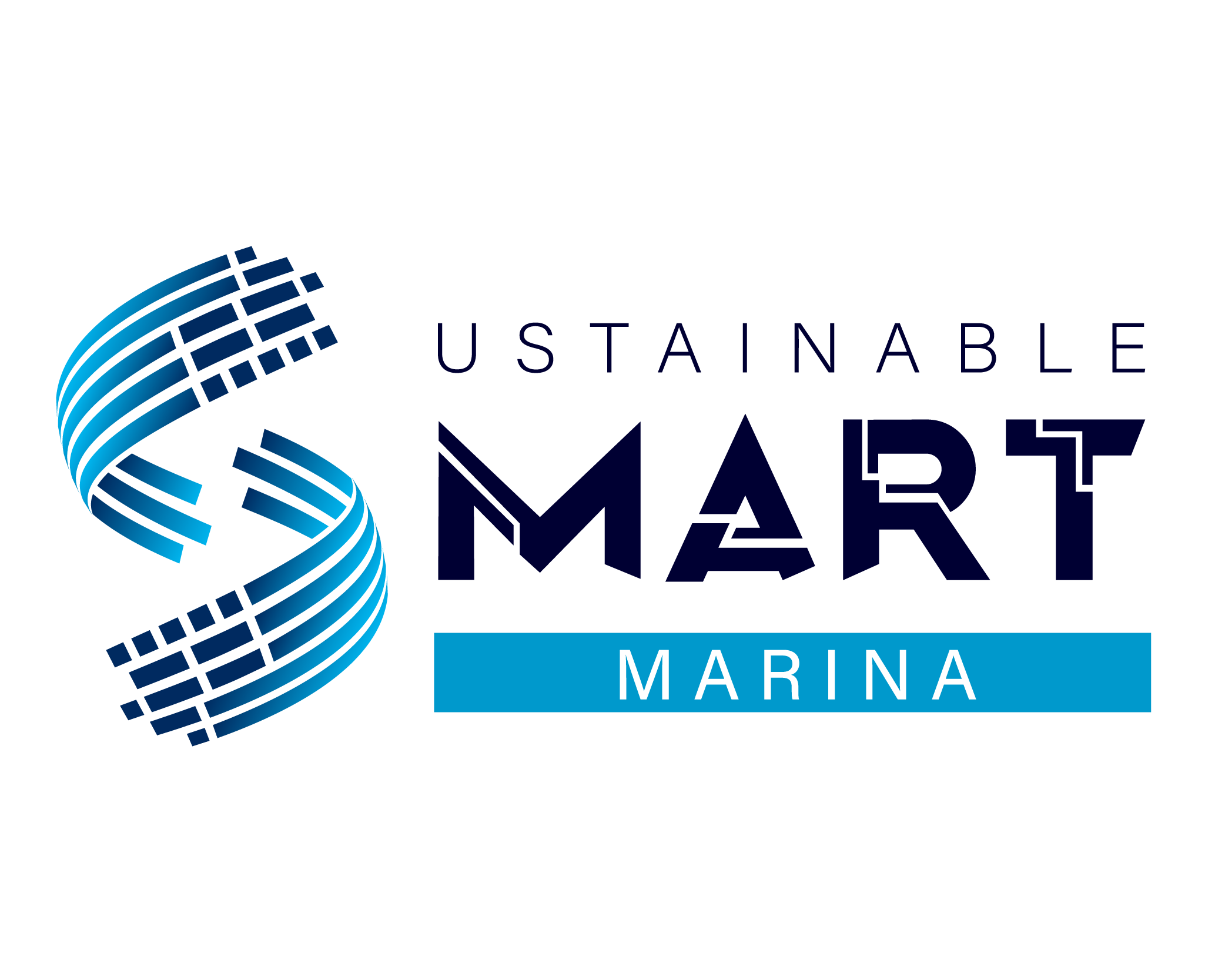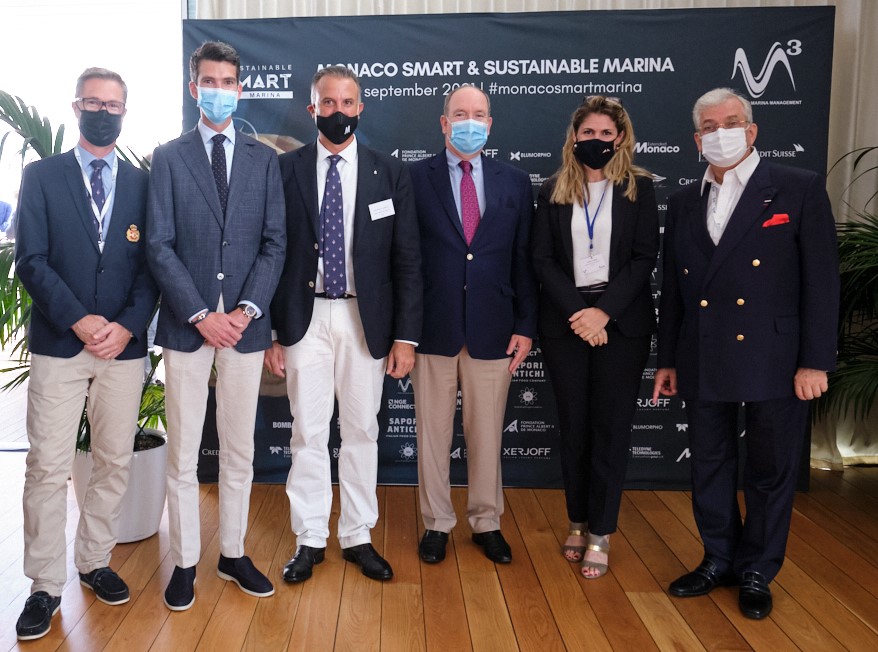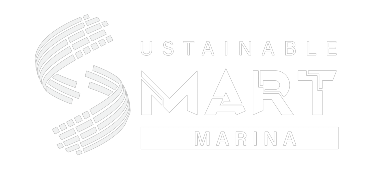Catalyst for innovation
Monaco Smart & Sustainable Marina | Monday 20th September 2021
The first Monaco Smart and Sustainable Marina rendezvous has just ended after a long process to select 55 international startups in this initiative organised by M3 (Monaco Marina Management). While demographic forecasts estimate that over 75% of the world’s population will be living in coastal regions by 2035, and given the yachting sector is expanding fast around the world with new destinations and marinas coming on stream, Monaco Smart and Sustainable Marina provides a unique exchange platform to put forward tangible solutions to build virtuous marinas, where technology is at the service of the environment. Monaco is therefore now positioning itself as the smart yachting capital. The meeting united an ecosystem of almost 250 people (in-person and online), representing the sector’s most important players (owners, shipyards, startups, industrialists, investors) who had an opportunity to discuss a global, collective response to climate challenges and encourage responsible innovation. Among those attending was HSH Prince Albert II, President Yacht Club de Monaco and HRH Princess Haïfa Al-Saud, Deputy Minister of Tourism, and HRH Princess Sarah Al-Saud, Director of Maritime Development at the Academy of Science, Technology and Maritime Transport in the Kingdom of Saudi Arabia, and first female captain of the Maritime Cooperation Council in the Gulf countries. The rendezvous was supported by the Prince Albert II of Monaco Foundation and the government’s digital transformation programme, Extended Monaco, alongside Credit Suisse which has established itself as the yachting bank, Bombardier, SBM Offshore, Teledyne, Xerjoff, NGE Connect and Yacht Club de Monaco who hosted the event.
Promoting innovation
“Promoting young companies who are improving production methods and who through their projects are building the marinas of the future, like condensed Smart Cities, is the essence of this meeting’s philosophy”, explained José Marco Casellini, CEO of M3 (Monaco Marina Management). “This first edition brought together an ecosystem of players whose collaboration will make it possible to exploit innovative technologies at the service of sustainable development to achieve carbon neutrality and respect for biodiversity,” noted Geraldine A. Gustin, CEO at Blumorpho.
- To consult the 55 startups in the E-Catalogue: sustainablesmartmarina.com/ecatalogue
The first to take the floor got straight to the heart of the matter. “The global impacts of climate change are expected to continue increasing in frequency and severity and will be irreversible for centuries, even millennia, and are undeniably linked to human activity,” said Marisa Drew, Chief Sustainability Officer & Global Head Sustainability Strategy, Advisory and Finance at Credit Suisse. Our carbon emissions would need to be reduced by 9% a year for eleven years to maintain the cap on 1.5oC set by the Paris Agreement. The financial sector has a role to play, particularly in the blue economy. Investing in sustainable solutions can and should be used as leverage for inspiring strategies for new businesses. The emergency is now, it is time to act – and in a thoughtful manner as evidenced by new resorts along the Red Sea which in tackling the issue of tourism in the region is “inspired by nature to develop a conceptual resort that will leave the coastline intact,” as explained by Nicholas King, in charge of the Red Sea Development project in Saudi Arabia. The European Commission continues to support a range of development projects promoting sustainable maritime ecosystems confirmed Linos Voskarides from the EC’s Directorate General Maritime Affairs and Fisheries.
Owners maintain their course
Yacht owners have got the measure of the problem and are determined to act together. While Richard Attias and Murat Vargi evoked the need for marinas to be pleasant places to live, offering a safe environment for yachts, their crews and guests, as well as wellbeing services, sports and children’s activities. Georges Cohen emphasised that before that happens it is vital that some key aspects be addressed. Appropriate electrification, use of a clean fuel so the yacht no longer has to rely on diesel generators, application of existing regulations, managing grey and black water, and drinking water – all are challenges that many marinas need to address. Same for Marco Casiraghi, who explained that numerous solutions already exist but are still not widely known or used. The concerns expressed by many yacht owners are not reflected to a great a degree by international regulators like the International Maritime Organisation (IMO). Both speakers insisted that those who do not respect the environment must pay the price for poor conduct, an awareness that can only be raised through education. They were joined by superyacht captain Matthias du Verle for whom these changes should involve the concept and design of a yacht. The discussions that followed addressed challenges faced by existing marinas with the prospects offered by new projects in sustainability, energy management, preserving resources and biodiversity, security and what the digital era can bring to the table.
Sustainability a priority
Concerns about sustainability took up most of the discussions. Once again, panellists stressed electrification as a priority for everyone particularly existing marinas, bearing in mind, as Aleco Keusseoglou, General Director of Ports de Monaco pointed out, it can be a daunting task for a busy marina operating all year round – but an essential one and now a high priority in Monaco. Routinely engaged in programmes to protect biodiversity, marina operators and promotors know that in yachting culture people search for freedom which naturally allies with being in harmony with ecosystems.
If today it’s possible to construct smart energy consumption buildings, there is no reason not to apply it to marinas argued Capt. Ahmed F. Shaker, Director of Marine Development & Operations, Sela (Saudi Arabia) who returned to the Jeddah Yacht Club & Marina development. Use of recycled materials, solar energy, a strict no-anchorage policy in the coral reef areas that surround the site, a ban on using non-biodegradable cleaning and anti-fouling products, and use of electric-only or electric and/or hydrogen powered boats are some of the initiatives taken.
All marinas should aim to exceed the regulations noted Ra’anan Ben Zur, promotor of Habacoa Yacht Club in South Abaco in the Bahamas, whose project presents similar solutions. While both admitted these projects represent a massive investment, they were seeing the value and not just from an ecological point of view. “Investment in protecting the environment should be included in companies’ accounts and incorporated into the overall value of any enterprise, which is not the case,” believes Brendan Jack, Director Sustainable Development at AMAALA (Saudi Arabia). Wang Dafu, President of the Visun Group in China echoed what had been said before explaining that use of green energy should be a priority combined with a much better use of resources. Tony Browne, Operations Director at Porto Montenegro added that they were able to implement such solutions from the start and reaped the benefits immediately.
There are so many opportunities for smart redevelopment of existing marinas with new construction materials such as “smart concrete” which helps regenerate marine habitats, noted Christian Denhard, Rybovich Superyachts Marina Director, evidence that solutions could be put into practice now, including those relying on innovations by the startups present on the one condition of really wanting to do so.
Priority to technical installations
David Queva from Monaco Marine, Henk Dreijr from MB92 and Philippe Vincensini, Director La Ciotat Shipyards, admitted there are many challenges, partly because they are starting from scratch and because as service providers they faced a complex “dilemma”: big investment in sustainability has an impact on financial returns, as it is not yet possible to turn these investments into higher costs. Although customers are more understanding now, all three believe the road ahead is still long and winding, and say educating crews, workers and even yacht owners is the key.
Smart marina mirrors a smart city
“Most solutions developed for cities can be applied to marinas,” according to Philippe Sajhau, Vice-President IBM France. Four resources are nevertheless priorities when designing a Smart Marina, namely energy, water, and waste and biodiversity management, said Eric Pingat, President of Pingat Property & Hospitality.
Regards energy, Alessandro Pellicano from ENEL-X points out that technologies exist and that it is possible to decarbonise a marina by delivering clean fuel to marina users. The main issue is the cost of fossil fuel which remains lower than renewable energy. This unfavourable imbalance raises the question of investment in infrastructure that could be resolved with Public-Private partnerships. For Eric Pingat in the current energy context, decarbonisation will only be possible by making the investment decision motivated by an environmental conscience. In a smooth transition to the next panel, Philippe Sahjau returned to the IBM Zero Carbon platform capable of managing the carbon footprint.
Technology as a priceless resource
The path to sustainable industrial development is through data sharing and transparency which drives digitisation tech players. At the heart of these discussions, the Digital Twin concept continues to prove its worth. A system capable of modelling and anticipating the carbon footprint of infrastructure, it can also model the environment and predict how it will evolve with the aid of artificial intelligence algorithms, as pointed out by Nicolas Leterrier, CTO at Schneider. David-Pierre Mangiapan from NGE Connect confirmed that a whole range of solutions exist to capture the environment and that savings of up to 20% can be made on water consumption and 50% for energy. Note that optimising resources requires recognising water as a critical resource that requires smart systems to maintain the infrastructure, particularly for detecting leaks. These were solutions Mark Brown from Teledyne picked up on when he spoke of infra-red sensor systems guaranteed to prevent leaks and anomalies by identifying hot spots and ultimately ensuring boat user safety. Deploying sensors opens up another group of applications said Nicolas Leterrier. Indeed, taking inspiration from electric vehicles, “rechargeable” yachts can also store electrical energy and supply the grid when necessary. This so-called “prosumer” approach could be an important element when developing an environmentally responsible boat in future marina-client cooperation. David-Pierre Mangiapan stressed the importance of allowing data to circulate to generate more value. Smart Solutions are often deployed for diverse applications and the key is merging all information to make the best decisions. For Mark Brown from Teledyne, digital solutions are necessary to achieve sustainability goals but come with a cybersecurity risk. Earl Presson commented that among startups competing for the Innovation Prize, companies dealing with cybersecurity received their full attention and that this initiative had resulted in them making contact to look at future collaborations.
And the winners are…
Of the hundred-plus applications, only 55 companies from 30 countries were shortlisted to participate by the experts at Blumorpho. The adventure continued with the Grand Oral of interviews conducted by a jury of experts comprising 32 industrialists investors and representatives from companies who are a reference in their field.
Led by Credit Suisse, Bombardier, SBM Offshore, Veolia, Bouygues Construction, Colas, Bosch, Suez, Holcim, PureTerra Ventures, BtoV, Circularity Capital, SNGLR, SMEG, Prince Albert II of Monaco Foundation, Yacht Club de Monaco and NGE Connect, 160 online interviews were organised over a period of three weeks. During these orals, each startup had a chance to defend and promote their project in the hope of winning one of the Monaco Smart & Sustainable Marine Awards announced at the end of the day on 20th September. After a Consensus Meeting (Thursday 16th September), 15 companies were selected in the following categories: equipment, health, energy optimisation, waste treatment, biodiversity and security. A handful went on to win the much anticipated prizes.
- To see who was on the Jury: https://sustainablesmartmarina.com/the-jury/
José Marco Casellini, CEO at M3 (Monaco Marina Management), surrounded by partners and institutions compered the Monaco Smart & Sustainable Marina Awards, congratulating the three best startups and four special ‘Coup de Cœur’ prizes awarded to Hospithome, Humint Consulting, Seaflex and Cyrias Technologies.
“We are very proud to be recognised by this award here in Monaco. Monaco is where awareness of the need to protect the marine environment was born, which is our raison d’être at Greencity Organisation”, said a delighted Isabelle Gerente, founder of this startup which won an Award.
For Catherine de Roincé, President of Terroïko who also won an Award: “It was a very inspiring day with many relevant talks that will help us stand back from our challenges and reflect (…) it’s a pleasure to receive an award from such a convinced and discerning audience, so I take this as a sign of a very genuine interest in our solutions.”
“Personally, I feel it’s a great achievement,” said Stéphane Paul, CEO of H2X-Ecosystems, third winner. “It’s fantastic for the team. It’s a hi-tech project that fits into an ecosystem to review business models and bring on board products that provide more benefits for the environment.” H2X-Ecosystems is also one of the companies to earn the Solar Impulse Label whose founder Bertrand Piccard sent a personal message to participants and organisers: “I am not surprised yet again to see Monaco’s pioneering spirit. It has proved very insightful to focus on marinas and yachts as there are so many solutions out there to make them more environmentally responsible. All participants have the opportunity to have an impact”.
The winners also have an opportunity to raise their profile even higher, by presenting their company and project at Monaco Ocean Week 2022, organised by the Prince Albert II of Monaco Foundation. After a packed day of meetings and interactions, participants have a date for another edition in September 2022.
Monaco Smart & Sustainable Marina Award winners
Credit Suisse Prize: Green City (France)
Bombardier Prize: Terroiko (France)
SBM Offshore Prize: H2X Ecosystems (France)
Coup de Cœur Prize Monaco Marina Management: Hospithome (Switzerland) and Humint Consulting (Italy)
Coup de Cœur Prize Credit Suisse: Seaflex (Sweden)
Coup de Cœur Prize Teledyne: Cyrias (USA)


